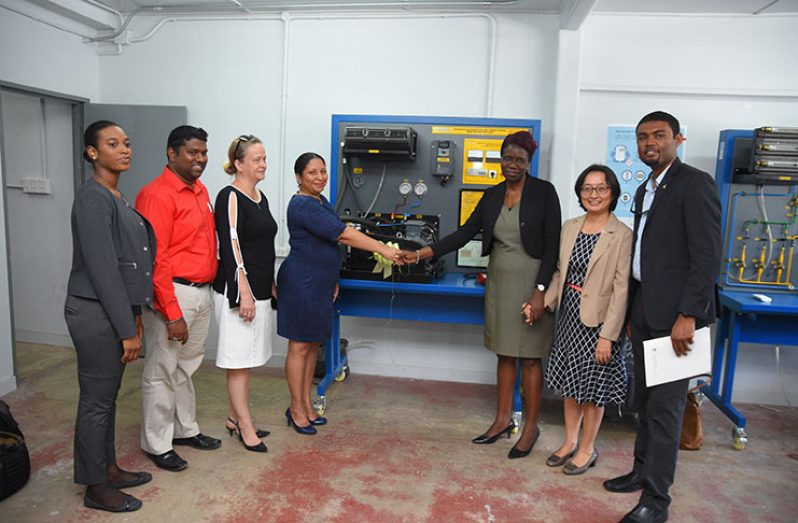THE University of Guyana (UG) Faculty of Technology has received $10M worth of refrigerant and air-conditioning equipment and a new refrigerant management course to aid in the elimination of harmful ozone gases.
This presentation was held on Tuesday at the Faculty of Technology and was made possible through collaborative efforts by the Ministry of Agriculture and the United Nations Development Programme (UNDP).
The kind gesture comes as a result of the HCFC Phase-Out Management Programme (HPMP) under the Montreal Protocol, which operates through the Hydromet Service of the Ministry of Agriculture.
Hydrochlorofluorocarbons or HCFCs are gases used worldwide in refrigeration, air-conditioning and foam applications, which are known as Ozone Depleting Substances (ODS).
In August 1993, Guyana ratified the Montreal Protocol which aims to systematically phase out the use of HCFCs and strengthen its global position on environmental protection.
By adhering to the Montreal Protocol schedule, the complete phase-out of HCFCs is expected to be realised by 2030.
However, in order for Guyana to successfully meet this goal, individuals must be trained in new and emergent technologies, which will replace the substances and equipment being phased out.

As such, the 8-10 week Refrigerant Management Course will target electrical and mechanical engineering students, as well as industry professionals who wish to acquire additional certification.
Meanwhile, the equipment donated, which include Visual and Automotive Refrigeration and Air-conditioning training units, as well as several other tools, will help students to better comprehend the course.
Support for this initiative was provided in part by the Multilateral Fund for the Implementation of the Montreal Protocol, while the UNDP, UN Environment and the Ministry of Agriculture partnered to execute the project.
Delivering the keynote remarks was Permanent Secretary of the Ministry of Agriculture, Delma Nedd, who said that the undertaking is a part of the government’s long-term plan for sustainable development.
Between 2011 to present, more than 125 technicians were provided with training on good refrigeration practices and alternative technologies, while some 80 technicians are trained annually through the HCFC Phase-Out Management Programme
This has contributed to a significant reduction in the number of untrained service personnel operating in the sector.
“The Ministry of Agriculture is pleased to be partnering with the Faculty of Technology through this initiative, which is expected to accrue significant long-term benefits for both the environment and human development in Guyana,” she remarked.
Nedd said Guyana’s strategy to phase out the importation of HCFCs includes the introduction of an import licensing system, as well as a national standard for the safe servicing of refrigerants and conditioning equipment.
Meanwhile, UNDP Representative Mikiko Tanaka, said implementation of the training programme and the acquisition of equipment will increase Guyana’s capacity to successfully manage and eliminate ODSs.
She re-affirmed the UNDP’s support for Guyana and commended UG for incorporating the training in its curriculum.
Dean of the Faculty of Technology, Elena Trim, told the gathering that as Guyana moves steadily ahead into the oil and gas era, buildings which will spring up will require central air-conditioning systems.
As such, she said that both mechanical and electrical engineers must be fully aware of how to deal with the new equipment in the sector.



.jpg)








